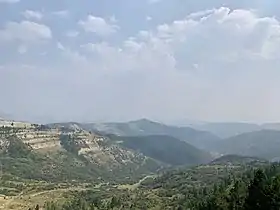Douglas Pass
Douglas Pass, elevation 8,205 feet (2,501 meters), is a mountain pass in the Book Cliffs of western Colorado. It is located in Garfield County and is traversed by State Highway 139. The pass divides the watersheds of West Douglas Creek to the north and East Salt Creek to the south. It is named for the Northern Ute, Chief Douglas.[1][2]
| Douglas Pass | |
|---|---|
 Douglas Pass in August 2020. | |
| Elevation | 8,205 ft (2,501 m)[1] |
| Traversed by | State Highway 139 |
| Location | Garfield County, Colorado, United States |
| Range | Bookcliff Mountains |
| Coordinates | 39°35′51″N 108°48′11″W |
| Topo map | USGS Douglas Pass |
The pass is not an especially high summit relative to other Colorado passes, and the road, though reasonably steep on the south side (7%), has no tight spots and only a few switchbacks. The summit gives an unusual view of the northeast face of the La Sal Mountains (twelve peaks over 12,000 feet), 76 miles (122 km) away in Utah. The remainder of the drive is basically in valleys following creeks.[3]
The Utes had established a trail over the pass, which was subsequently used by European explorers and settlers. The Domínguez–Escalante expedition crossed the pass in 1776. Following the Ute trail, a road over the pass was constructed in the 1920s.[2][4]
The mountain consists of shale strata belonging to the Green River Formation, exposures of which can be seen on the south side of the pass.[5]
References
- "Douglas Pass". Geographic Names Information System. United States Geological Survey, United States Department of the Interior.
- Helmuth, Ed; Helmuth, Gloria (1994). The Passes of Colorado: An Encyclopedia of Watershed Divides. Boulder, Colorado: Pruett Publishing Company. ISBN 0-87108-841-X.
- "Douglas Pass". dangerousroads.org. Retrieved 30 January 2021.
- Rynearson, Larry; Jones, Rick (2014). Colorado's Historic Mountain Passes. Lake City, Colorado: Western Reflections Publishing Company. ISBN 978-1-937851-19-4.
- Boak, J., Sarg, R., Tanavsuu, K. and Yeakel, J. 2009. Oil shale of the Piceance Basin, Colorado. Colorado School of Mines, Guidebook of the 29th Oil Shale Symposium field trip, October 22–23, 2009, Stop 4.